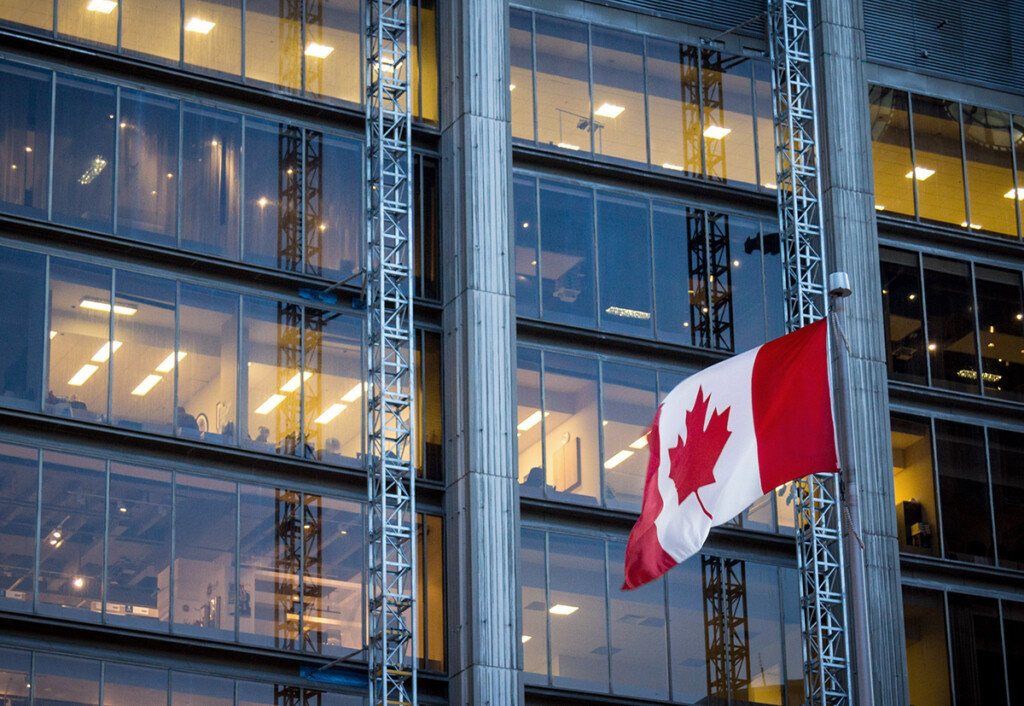
On November 30, the Honourable Chrystia Freeland, Minister of Finance, put forward the Government’s Fall 2020 Economic Statement. The document referred to as “FES 2020” provides updated economic forecast numbers, announces a number of measures specifically related to the Covid-19 pandemic, and puts forward a number of income tax and GST measures for either current implementation or future study.
FES 2020 projects a total budget deficit in the current (2020-21) fiscal year of over $380 billion dollars, dropping to approximately $120 billion in the following fiscal year and down to approximately $25 billion annually by the 2025-26 fiscal year. Note, however, that these deficit amounts do not take into account a planned $70 to $100 billion stimulus spending to be incurred over the next three fiscal years. Even before that planned stimulus spending, the government projects total federal debt as a percentage of GDP, which was at 31.2% in the immediately past fiscal year (2019-20), to rise to 50.7% in the current fiscal year and 52.6% in 2021-22 before very slowly declining to just under 50% in 2025-26. Further details of the Government’s economic and fiscal projections may be found in the full FES 2020 documents.
The focus of this report is on changes affecting businesses and their employees.
Covid-19 Pandemic Relief
Unsurprisingly, front and centre in FES 2020 is the direct fight against Covid-19 and the support of Canadian individuals and businesses suffering hardships as a result of the pandemic. The list of government actions, most of which has been previously announced, is extensive. Changes of particular interest announced in FES 2020 include the following.
- Canada Emergency Wage Subsidy (CEWS). As previously announced, this program has been extended until June 2021. In addition, it is now proposed that the existing 65% subsidy rate be increased to 75% for the period from December 20, 2020 to March 13, 2021.
- Canada Emergency Rent Subsidy (CERS). This program provides businesses and charitable and other non-profit organizations with a subsidy for rent and mortgage payments; as this is obtained directly from government, no negotiations with landlords or lenders are required. As previously announced, this subsidy is currently provided at rates up to 65% of eligible expenses through December 19, 2020. FES 2020 proposes to extend this 65% subsidy rate to March 13, 2021.
- Lockdown Support. This program, originally announced on October 9 with retroactive effect to September 27, 2020, provides businesses and charitable and other non-profit organizations with additional support for rent and mortgage payments (in addition to that available under CERS) where they are required to shut their doors or significantly limit their activities under a public health order. FES 2020 proposes to extend this 25% support to March 13, 2021.
- Canada Emergency Business Account (CEBA). This program provides loans of up to $40,000 to eligible businesses and non-profit organizations, with 25% forgivable if certain criteria are met. It is now proposed to expand this program, allowing for an additional $20,000 loan with 50% of that additional amount being forgivable.
Portions of the FES 2020 materials addressing these measures are found here (expenditures to fight Covid-19 spread and support medical treatment) and here (economic support for individuals and businesses).
Current Income Tax Measures
In addition to the “big ticket” economic support items relating to the Covid-19 pandemic, FES 2020 proposes several changes relating to income tax.
Employee Stock Options
In its March 19, 2019 federal budget, the government proposed a number of changes to the tax treatment of stock options granted to employees of a “qualifying person”. These proposals were further expanded upon in a Notice of Ways and Means Motion on June 17, 2019. On December 19, 2019, the Department of Finance announced that it would defer action on those proposals in order to take into account the results of public consultations in the interim. FES 2020 now proposes to move forward with those proposals with some modifications and clarifications.
Under the existing tax rules, an employee who acquires shares of an employer (or an affiliate) under the terms of a stock option plan is required to include in income a benefit (the “stock option benefit”) equal to the fair market value (“FMV”) of the shares acquired less the amount the employee pays (including both option premium and exercise price) for the shares. The stock option benefit is generally included in the employee’s income when they acquire the shares; however, where the employer is a “Canadian-controlled private corporation” (“CCPC”) at the time the option is granted, the benefit is only included in income at the subsequent time the employee disposes of the shares acquired.
While the existing rules include the amount of the stock option benefit in income, in some circumstances these rules provide for relief from full taxation by allowing the employee to claim a deduction (the “stock option deduction”) equal to 50% of the amount included in the employee’s income as described above.
Also under the existing rules, an employer is not permitted a deduction from its own income in relation to the stock option benefit realized by the employee. The 2019 proposals contemplated a possible employer deduction in certain limited circumstances, but the terms of that possible deduction were not fully settled in the 2019 budget or in the subsequent Notice of Ways and Means Motion.
FES 2020 now proposes to move forward with stock option proposals reflecting the same general approach as the 2019 version.
- The new rules will not apply to stock options granted by an employer that is, at the time the option is granted, either (a) a CCPC, or (b) a non-CCPC with annual gross revenues of $500 million or less. The FES 2020 materials indicate that this exclusion “will ensure that start-ups and emerging Canadian businesses that are creating jobs can continue to grow and expand and attract key talent, while limiting the benefit of the employee stock option deduction for high-income Canadians who work in mature companies”.
- Where these rules apply, the entitlement of an employee to claim the stock option deduction in each year is limited to options in respect of shares having FMV of a maximum of $200,000, with such FMV being determined at the time of grant of the option, as described below.
- The $200,000 limitation is applied in each year in which the employee first becomes entitled to exercise a particular stock option (e., in the year in which the option vests), with any shares to be acquired under the stock option in excess of the $200,000 limitation referred to as “non-qualified securities”. This timing applies irrespective of whether the option is exercised in the year of vesting or a subsequent year.
- Time of vesting of a stock option is determined by reference to the terms of the option agreement and as at the time of grant. Where the time of vesting is unclear, the option will be considered to vest on a pro rata basis over the period ending at the last date that shares could be acquired under the stock option, to a maximum of sixty months.
- The limitation is applied on a global basis with respect to all options granted by a particular employer to a particular employee, with options vesting in a particular year being considered in order of their grant.
- Where an employee stock option is subject to the new rules but gives rise to entitlement to the stock option deduction (i.e., satisfies the $200,000 limitation referenced above), the employer will not be entitled to a deduction in computing its income; this treatment is the same as under the existing rules for stock options. However, in the case of stock options in respect of non-qualified securities (e., exceeding the $200,000 limitation), while the employee will include the full amount of the stock option benefit in income and not be entitled to the stock option deduction, the employer may generally be entitled to a deduction, in the year the employee exercises the option, equal to the amount of the benefit included in the employee’s income.
- Where an employer is otherwise subject to the new rules (e., is neither a CCPC nor a non-CCPC with gross revenues less than $500 million), it appears that they may elect to be fully subject to the new rules. In such a case, the employee would not be entitled to any stock option deduction (even in respect of options otherwise falling below the $200,000 limitation), but the employer could claim a deduction equal to the full amount of the stock option benefit realized by the employee.
- The new rules will only apply to options granted after June 2021.
As is evident from the foregoing description, these rules are extremely complex, and will give rise to significant employee communication, information reporting and compliance obligations. We anticipate that additional issues and complexities will come to light as the draft legislation provided in respect of these proposals is considered by the tax community.
Home Office Expenses
Given the prevalence of Canadian taxpayers in various work-from-home arrangements, FES 2020 proposes a simplified process for claiming home office expenses of up to $400 without detailed tracking or obtaining a form from their employers. This proposal is to apply for 2020 only, with details to be announced in the coming weeks.
Current GST Measures
Face Masks and Face Shields
FES 2020 proposes to zero-rate specified types of face masks and face shields, such that GST/HST would not apply to their purchase. This relief would apply to purchases of such items from December 7, 2020 until such time as they are “no longer broadly recommended by public health officials for the COVID-19 pandemic”.
E-Commerce
FES 2020 proposes expanded imposition of GST/HST registration, collection and remittance obligations in three specific areas outlined below. The government has invited comments from interested parties, with a deadline for such comments of February 1, 2021.
Importation of digital products and services
At present, non-residents who do not carry on business in Canada are not required to register for or collect GST/HST; this is the case even where the non-resident is dealing with a Canadian-resident customer. In such cases, where the non-resident sells physical goods to a Canadian customer, applicable GST/HST is imposed on the importation of the goods. Where the non-resident instead provides “digital products or services” to the Canadian customer, the customer “is required to self-assess and pay the applicable GST/HST directly to the Canada Revenue Agency”. While the latter may be the law, it is safe to assume that Canadian customers purchasing such digital products or services outside the business context (where they would generally receive a full “input tax credit” for the GST/HST paid) rarely if ever comply with this requirement.
To capture this apparent foregone revenue, FES 2020 proposes to require such non-resident vendors to register for, collect and remit GST/HST on such supplies to Canadian-resident purchasers. An exception would be provided for purchases by a GST registrant that is resident in Canada and purchasing the digital products or services entirely for use in a commercial context. In addition, the exemption available for “small suppliers” of $30,000 or less to Canadian-resident purchasers would apply.
The FES 2020 materials include draft legislation and further details as to the application of these proposals, which are to enter into force on July 1, 2021. Further details, including some indication of how CRA is expected to enforce these requirements, may be anticipated before that time.
Distribution platforms and fulfillment warehouses for sales of goods
FES 2020 notes that goods sold by a non-resident vendor to a Canadian customer is subjected to GST/HST on the “value” of the goods on importation into Canada, which may be less than the final sale price to the customer. Under existing rules, the non-resident vendor is not regarded as carrying on business in Canada by virtue of merely holding such imported goods in Canada, and as such is not required to collect GST/HST on the final sale.
In order to capture this apparent foregone GST/HST revenue, FES 2020 proposes to impose GST/HST registration, collection and remittance obligations in respect of goods sold by non-residents through fulfillment warehouses situated in Canada. These rules will apply to distribution platform operators and to non-resident vendors selling goods in Canada through fulfillment warehouses but without the involvement of a distribution platform operator.
As with digital products and services addressed above, the small supplier exemption would be potentially available. The FES 2020 materials include draft legislation and further details as to the application of these proposals, which are also to enter into force on July 1, 2021.
Platform-based rental of short-term accommodations
FES 2020 observes that GST/HST is applicable to rentals of short-term accommodations, subject to the “small supplier” exemption, but that operators on a larger scale “may not be aware of” their obligations to register for, collect and remit GST/HST. With this in mind, FES 2020 proposes to impose GST/HST registration, collection and remittance obligations on accommodation platform operators.
- GST/HST registrant owners of short-term accommodations would continue to be obligated to collect and remit GST/HST on their rental charges.
- Operators of short-term accommodation platforms would be treated as the supplier of such accommodations in cases where the owner is not a GST/HST registrant. As such, the operator would be required to register for, collect and remit GST/HST on the applicable rental charges; this requirement already applies to operators that carry on business in Canada, but by these proposals would extend to operators not carrying on business in Canada.
- The rate of GST/HST imposed would be determined by reference to the location of the accommodation premises.
- As with the other suppliers addressed above, the small supplier exemption would be potentially available.
- Service fees charged by the platform operator to the owner generally would not be subject to GST/HST.
As with the previous GST/HST matters addressed above, the FES 2020 materials include draft legislation and further details as to the application of these proposals, which are also to enter into force on July 1, 2021.
Other Tax Measures
Empty Homes Tax
In a move which will be familiar to many residents of British Columbia, FES 2020 contemplates the introduction of a tax to be imposed on non-Canadian non-resident owners of domestic housing. This tax would be imposed nationally, and would be intended to target “the unproductive use of domestic housing … which removes these assets from the domestic housing supply”. While no details, scope or specific implementation dates are provided, the proposals indicate that steps will be taken to implement such a tax over the coming year; as such, it appears conceivable to anticipate implementation as early as 2022.
Tax Audit and Enforcement
Over the past several years, the government has provided CRA with substantial annual incremental funding (up to $350 million per year) directed, in the language used in FES 2020, “to crack down on tax evasion and combat aggressive tax avoidance”. The government proposes to add “an additional $606 million over 5 years … to allow the CRA to fund new initiatives and extend existing programs targeting international tax evasion and aggressive tax avoidance”. The government asserts that these expenditures would generate an incremental $1.4 billion in federal tax revenues over five years[1].
Future Study and Consideration
Digital Services Tax
FES 2020 references challenges to nations and taxing authorities in relation to multinational corporations providing digital services around the world. These challenges are the subject of ongoing international discussions led by the Organization for Economic Co-operation and Development (“OECD”). In FES 2020, the government indicates that it “remains committed to a multilateral solution, but is concerned about the delay in arriving at consensus”.
As such, FES 2020 indicates that it will propose to impose a tax on providers of digital services with effect from January 1, 2022, which would be applicable “until such time as an acceptable common approach comes into effect”.
Further details with respect to such a tax is to be included in the 2021 federal budget.
Anti-Avoidance Rules
FES 2020 proposes the undertaking of consultations with a view to “modernizing” the web of existing anti-avoidance rules comprising a part of the Canadian tax legislative framework, specifically including the so-called “general anti-avoidance rule” originally introduced in 1987. While there is no indication of specific issues which the government wishes to address in these consultations, it may reasonably be expected that their objective is not to narrow the application of such rules. These consultations are stated as being undertaken over “the coming months”, but with no other indications as to timetable or the nature of such consultations.
[1] Having regard to past projections in relation to such initiatives, this figure may refer to gross tax reassessments without offset for the results of objections and appeals in respect of those reassessments; the FES 2020 materials do not address this point.



